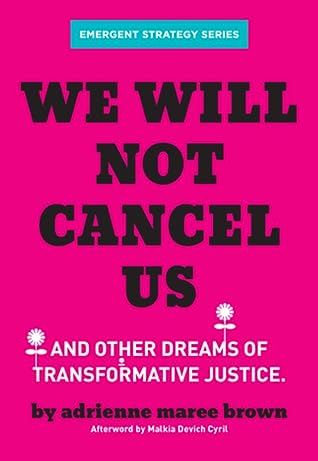More on this book
Community
Kindle Notes & Highlights
Read between
December 5 - December 7, 2021
Emergent strategy suggests that we must work hard at getting abolitionist practice functional at a small scale so that large-scale abolition and transformative justice are more visible, rootable, possible.
We are seeding the future, including our next systems of justice, with every action we take; the fractal nature of our sacred design teaches us that our smallest choices today will become our next norms. I am concerned with what that looks like with conflict resolution and accountability within movement.
It manifests as white supremacy, male supremacy, ableist supremacy, straight supremacy, cis supremacy, and more—the belief that some of us are normal, are better, are justified to take and do whatever we want,
I looked at metaphors from human history that demonstrate ways that we are unique amongst every other species we know in terms of how we reason and communicate, but stay committed to gleeful vengeance and collective punishment.
As Maurice Moe Mitchell said, we have to have a low bar for entry and a high standard for conduct.
In my mid-term vision, movements prioritize building the capacity, skill and wide hearts to receive new comrades, while practicing daily and deeply what it means to sustain our relationships and collective visions, uphold our values, and adapt towards purpose.
Where we are skilled at being honest, setting and honoring boundaries, giving and receiving apologies, asking for help, and changing our behaviors.
I wonder about the movements in those countries, what it might feel like to live and organize in a place that truly orients towards life.
The U.S., as a nation, does not choose, or love, life. Not in our policies, in our safety practices, in our relationship to the planet and other nations. Not yet, and possibly never before.
Call outs have a long history as a brilliant strategy for marginalized people to stand up to those with power. Call outs have been a way to bring collective pressure to bear on corporations, institutions, and abusers on behalf of individuals or oppressed peoples who cannot stop the injustice and get accountability on their own. There are those out of alignment with life, consent, dignity, and humanity who will only stop when a light is shined onto their inhumane behavior.
Right now, call outs are being used not just as a necessary consequence for those wielding power to cause harm or enact abuse, but to shame and humiliate people in the wake of misunderstandings, contradictions, conflicts, and mistakes.
I am not speaking of survivors naming their abusers or perpetrators here—the work of a survivor is to survive, using any and all tools available to stop the abuse and pain being exacted upon them.
The tools of swift and predatory justice feel good to use, familiar, groove in the hand easily from repeated use and training, briefly satisfying. But these tools are often blunt and senseless.
Shaming behaviors of abuse in a culture where they have been normalized is, and has been, a necessary survival technology.
Call outs feel most powerful when they are used with their tactical intention—for those with less positional, political, economic, or other power to demand accountability to stop harm or abuse.
Here are some questions I sit with when I am asked to engage in a call out: Have there been any private efforts for accountability or conflict resolution? Is/are the survivor(s) being adequately supported? Has the accused individual or group acknowledged what they’ve done, or are they saying something different happened, or even that nothing happened? Has the accused individual or group avoided accountability? Have they continued to cause harm? Has the accused already begun the process of taking accountability? Does the accused person have significantly more power than the accuser(s)—in what
...more
But call outs need to be used specifically for harm and abuse, and within movement spaces they should be deployed as a last option.
I want our movement to feel like a vibrant, accountable space where causing harm does not mean you are excluded immediately and eternally from healing, justice, community, or belonging.
Moving towards life affirming movements includes asking: In cases of abuse or assault, what does the survivor need? In cases of conflict, what resolution is possible? What are the visible and invisible power dynamics? Do I have the necessary information to form an opinion? Do I have the time to seek understanding? Did a conversation/process already happen? Is a conversation/process possible? How do we be abolitionist while gaining accountability here? Who benefits from me doubting that our movement can hold this? Who could hold this well? What will end the cycle of harm here? What will help us
...more
most cases, very complex realities get watered down into one flawed aspect of these people’s personalities, or one mistake or misunderstanding. A mob mentality takes over then, an evisceration of character that is punitive, traumatizing, and isolating.
also reject the right-wing myth that in calling out harm, the Left proves itself intellectually rigid. I reject the idea that in our attempts to bypass a brutal criminal legal system by using our voice instead of the police, we have somehow moved from being defenders of dissidence to suppressors of speech. That is right-wing propaganda and white supremacy’s lie. That is patriarchy’s gaslighting and capitalism’s violence. For criminal legal violations that cannot be entrusted to the law, asymmetrical responses like call outs are exactly right.


